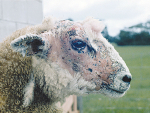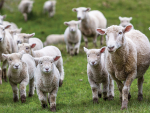FACIAL ECZEMA (FE) is a disease with a huge economic impact in the warm humid areas of New Zealand, points out Robin Pharmaceuticals, maker of the FiltaBac treatment for the disease.
FE affects dairy and beef cattle of all ages, younger animals being more susceptible, sheep and red deer also being affected by Pithomyces chartarum fungal spores.
Prevention is always paramount in managing productivity however the problem grows when physical (clinical) symptoms of FE appear: the extreme damaging effects from the Sporidesmin toxin causes liver damage, which can then lead to photosensitisation of the white or non-pigmented skin on cattle and sheep.
Photosensitivity occurs because the FE damaged liver cannot remove wastes and a breakdown product of grass pigments (chlorophyll) accumulates. The non-pigmented or thin skin thickens, cracks, peels and causes pain. Cows are restless at milking time, seek shade and lick their udders.
In some cases the teats and udder become so severely damaged it is impossible to milk the affected quarter of the cow.
FiltaBac Cream was formulated by Robin Pharmaceuticals Ltd in 1971, has been registered with the Animal Remedies Board since then, and has proved effective in alleviating the extreme skin damaging effects of facial eczema.
Robin Pharmaceuticals chief executive Samantha Sinclair attributes FiltaBac cream’s effectiveness to its sun and light blocking action achieved by the high percentage of non-absorbed, inert mineral compounds titanium dioxide and zinc oxide in the cream. These two sun-blockers, combined with the anti-bacterial qualities of the cetrimide and benzalkonium chloride, calm the skin and promote wound healing, Sinclair says.
“What also happens when FiltaBac is applied onto the damaged skin area is that there is an almost immediate soothing, pain relief reaction,” she says.
“This allows for the affected quarter(s) to be protected like a second skin covering and at the following milking, after cleansing the area, the affected quarters could be milked. Following this method does not produce milk grades.
“The real benefit is the barrier cover FiltaBac Cream provides, simulating the properties of undamaged skin, allowing for moist wound healing, preserving the new skin cells, allowing them to breathe and maintain correct moisture levels.”
www.aniwell-nz.com

















